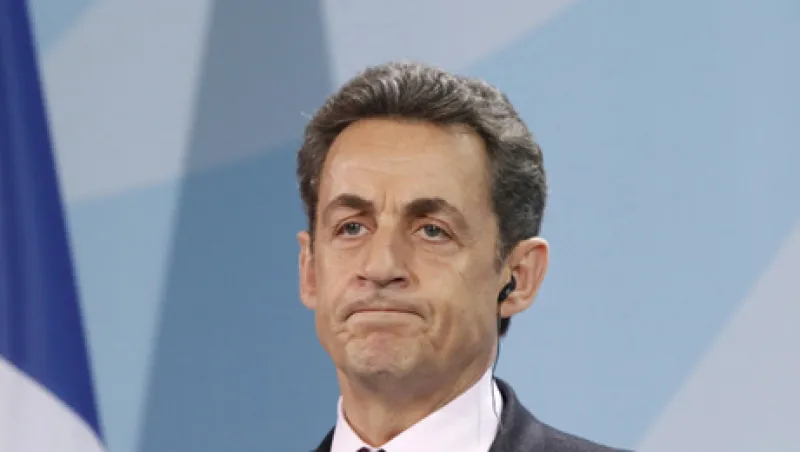Euro zone stock markets plunged on Monday on signs that painfully crafted political plans to nurse euro zone member states back to fiscal health were being undone by a political backlash against the attendant austerity.
These included Sunday’s defeat for the incumbent in the first round of the French presidential election and Saturday’s collapse of the Dutch government.
Equity markets were battered further by a disappointing survey of the euro zone economy. This added to recent evidence that the fragile recovery, which had appeared to follow the incomplete political and economic resolution of the euro zone crisis at the end of last year may have been illusory.
The provisional monthly Purchasing Managers' Index (PMI) survey by Markit Economics suggested that euro zone output declined in April at its fastest pace in five months — prompting companies to cut their workforces with the greatest severity in two years.
Responding to the political news, Jim Reid, head of global fundamental credit strategy at Deutsche Bank in London, said: “All year we’ve been of the opinion that problems with austerity would be the reason this sovereign crisis would reignite as we approached the second half. The French and Dutch are now political headaches for Europe.”
Chris Williamson, chief economist at Markit, said, “The flash PMI signaled a faster rate of economic contraction in the euro zone during April, extending what appears to be a double-dip recession into a third consecutive quarter.”
Official euro zone data shows a fall in output in the final quarter of last year, and both official numbers and Markit PMI surveys suggest output may have declined again in the first quarter of this year.
In France the first round of the presidential election showed the Socialist candidate François Hollande in the lead with 28.6 percent of the votes — 1.5 percentage points above his nearest rival, Nicolas Sarkozy, the center-right current president. This suggests that Hollande is likely to win the second and final round of the election — a run-off with Sarkozy — on May 6. Sarkozy has suffered the fate of many other European incumbents: His popularity has been damaged by government parsimonies meted out because of parlous public finances.
Fears that Hollande will place little priority on reducing France’s fiscal deficit are overdone, according to some analysts. He has pledged to bring it down from 5.2 percent of gross domestic product (GDP) last year to zero by 2017.
However, the publicly disclosed calculations behind Hollande’s plans to end the deficit rely on a quick and strong bounce back in French economic growth. Many analysts regard this as unrealistic, given continuing economic problems in the euro zone. If growth remains weak or nonexistent, Hollande’s sums will not add up.
Moreover, some analysts think Hollande’s prescriptions for closing the fiscal gap could stymie economic growth. These include an increase in tax revenue from large corporations — which could hit business investment — and a 75 percent tax on people with incomes above €1 million a year. Critics say this rate, which is far higher than anywhere else in Europe, would reduce the rewards for entrepreneurialism, and could, perversely, cut the tax receipts. Tax revenue from the highest earners fell in many European countries in the 1970s in response to similar rates — partly because of more aggressive tax avoidance.
An added fear for markets is that regardless of whether Hollande or Sarkozy win, both candidates may be forced, before May 6, into highly Eurosceptic pledges to win over the supporters of the far-right National Front candidate Marine Le Pen, who exceeded all predictions by winning 17.9 percent of the vote. This could imperil the Franco-German political truce created by Sarkozy and German Chancellor Angela Merkel, by which the euro zone’s two most powerful economies have agreed to support the finance ministries of other euro zone member states rather than following isolationist policies. Both men had already, on Monday, expressed sympathy for some key concerns among Le Pen voters.
In the Netherlands, the coalition government imploded on Saturday when Geert Wilders, another far-right politician, walked out of talks over budget cuts after saying it was not in his country’s interest to meet the European fiscal deficit limit of 3 percent of gross domestic product. This figure had been agreed by EU politicians last year to prevent future debt crises.
Defenders of fiscal austerity say its medicine is bitter but necessary to prevent panic in euro zone bond markets. However, Monday’s PMI survey suggests it may be slowly killing the patient. The composite PMI, which includes private-sector services and manufacturing, fell by 1.7 points to a five-month low of 47.4 — far below the 50 level which marks the dividing line between contraction and growth. The severity of previous European downturns was tempered by higher government spending, but bond investors’ fears about public finances have, this time around, forced governments to do the opposite.
Markit Economics blamed a poor showing in the French PMI figures partly on a “general ‘wait-and-see’ attitude among households and businesses in the run-up to the presidential election” — a sign of how political uncertainty can directly affect the economy. Its French subsurvey showed activity declining at its fastest pace in six months.
Equity markets bore the brunt of fears about euro zone growth unleashed by Monday’s signs of political and economic uncertainty — continuing their recent whipsaw action of recent days. The Eurofirst 300 index of euro zone equities sank 2.4 percent to 1,021, with France’s CAC 40 index outstripping even this fall to end 2.8 percent lower at 3,098.






